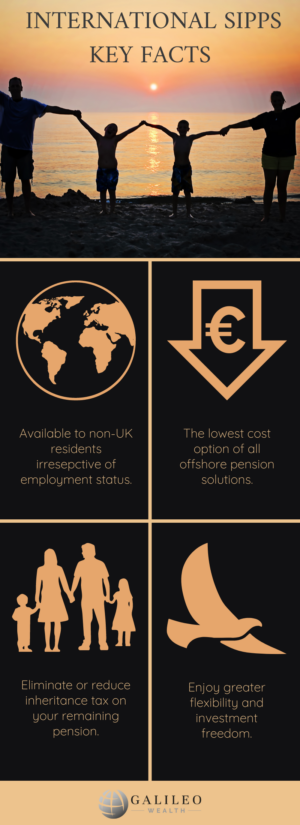Might a SIPP Be the Best Choice For Expats Looking to Grow Retirement Wealth?
We’re living longer – But is our Retirement Planning keeping up?
It’s great news that we’re all living longer than ever. By 2050 the World Health Organisation predicts there will be three times the number of 80+-year-olds than there were in 2020. Since we can all reasonably expect to be enjoying life long into our 80s, this begs the question of whether you’ll have the resources to do so in style. This should naturally put reprioritising your finances and retirement planning at the top of the agenda while you have enough time left to make a difference.
One of the most important factors in expat retirement planning is having access to a pension product that allows you to maximise your retirement income, minimise your tax liability and give you optimal access and flexibility with your money. For this reason, many expats look at SIPPs for their pension transfer options. But would a SIPP be right for you? Let’s find out.
The Self-Invested Personal Pension (SIPP) has been around since the 1980s
For those who want to take control of their retirement savings, a SIPP has several fundamental benefits over your traditional workplace contribution-based pension. These include:
- Greater flexibility and control – it puts you in the driving seat of your pension growth plans;
- The ability to invest in assets such as stocks and shares, land and commercial property, peer-to-peer lending, commodities, open-ended investment companies (OEICs) and more;
- Giving you control of how much and how often you contribute;
- Invest in riskier assets with potentially much higher returns;
- Tax efficiency – freedom from capital gains and income tax on your investment growth;
- Tax relief on your contributions if you’re a UK taxpayer.
What’s the best SIPP for non-UK residents?
If you’re a non-UK resident, you’re going to be looking at setting up an International SIPP (iSIPP). This is a pension wrapper for those living, earning and/or retiring overseas and offers an even wider range of investment products than a UK SIPP.
The key features of an iSIPP include
- Increased flexibility and choice of investment products;
- Simplicity offered by the ability to consolidate all your pensions into one pot;
- Greater access and control of your pension from overseas;
- Ability to transfer your pension into another plan if necessary/desired;
- Protection from currency risk by building your pension portfolio either in the currency you intend to spend it in, or by creating a natural hedge by diversifying currency holdings.
- Tax efficiency – benefiting from lucrative investment opportunities is always sweeter when the profits are exempt from capital gains tax;
- You can take a lump sum of up to 25% of your pension fund free of UK tax;
- You’ll benefit from a flexi-access drawdown facility;
- Tax and estate planning benefits – if you die before 75 your full SIPP value will be exempt from UK inheritance tax for your beneficiaries; over 75, payments will be taxed at the marginal rate.
You can transfer almost any type of pension into an international SIPP, including
- UK SIPPs and other personal pension schemes;
- Occupational pensions, including defined benefit pensions;
- QROPS.
Our recent blog on expat UK pension transfers has more in-depth information on whether an iSIPP or QROPS might be right for you when moving your pensions overseas.
Is a SIPP the best choice for expats to grow retirement wealth?
If you’re living overseas and looking to transfer your pension, a SIPP might be the best option for you, however, it would be unethical for us
to prescribe this without knowing your full circumstances. We’ve previously covered the differences between QROPS and SIPP options, from which you may be able to deduce the answer. In all honesty, you’ll need specialist, personalised expat pensions advice to know for certain.
How to know if a SIPP is right for you
If you’re the kind of person who’s willing to take a little short-term risk in exchange for longer-term high returns, then a SIPP might be for you. If you’re looking to turn a quick profit, or you’re overly anxious about day-to-day fluctuations in your pension value, then a SIPP might be a little too much of a rollercoaster for your sensitivities.
Even if you do have a lower appetite for risk with saving and investing, there are some SIPP providers that offer lower-risk investment profiles for your pension, but of course these generally come with glass ceilings as the trade-off for enhanced security.
A SIPP might be right for you if you have a keen interest and understanding of financial markets and have the time to spend researching and actively managing your investments. If you don’t have the time, inclination or knowledge to manage your SIPP yourself, you’ll need a cracking financial adviser to take the helm on your behalf. (Hi. Have we met?)

Breakdown of the costs involved in transferring a personal pension into an International SIPP
Out of the two main options for expat pension transfers, SIPPs are generally the lowest cost, though the wider and more complex the investment options in your SIPP the higher the charging structures. When transferring your pension to an international SIPP you’ll need truly expert advice about whether the benefits will outweigh the costs.
Without proper retirement planning and advice, research shows that choosing providers with fee structures that aren’t optimised for your unique circumstances can erode your pension pot by up to £100,000.
You may encounter fees like:
- Exit fees from your existing pension scheme – these can be high if you’ve previously transferred to a SIPP or QROPS;
- Trustee costs;
- Set-up charges;
- Platform service charges;
- Adviser costs;
- Fund costs.
Who is eligible for an International SIPP?
International SIPPs are generally available to most non-UK residents or British expats irrespective of employment status. So, you may be eligible if you’re self-employed, not working, employed or even already retired.
How to transfer your pension to an ISIPP
We outline the steps involved in transferring your pension to an iSIPP below.
- Request a current cash equivalent transfer value (CETV) from your pension scheme provider;
- Carry out thorough research into SIPP schemes and transfers;
- Seek out qualified pension transfer advice;
- Assess all costs associated with transferring, along with any losses you may incur while out of the market during a transfer;
- Select your SIPP provider and choose from their range of investment options – it may be possible to transfer some of you existing funds as they are if the investments are available on your new provider’s platform;
- Authorise the transfer, being aware of common pension scam strategies;
- Your new provider will then contact your current providers to arrange the transfer.
Expats can grow Retirement Wealth with expert advice on Offshore Pension Plans

The self-invested personal pension or SIPP can be a great way for expats to grow retirement wealth. It’s flexible, has comparatively low annual costs and offers many tax advantages. But, as with most things related to pensions and tax planning, there can be so many complications and risks in transferring your pension. Not only are there legitimate costs and market risks, but you’re also at risk of being exploited by scammers.
You should also speak with an independent financial advisor who understands international pension plans so they can help guide you through the process of choosing an appropriate plan that meets all of your requirements and keeps your money safe.
Get in touch and let’s start building the future you deserve together.



